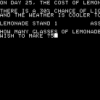Hello there,
this is my first post so i'd like to give a little background.
I'm a software engineer since 2004, and i work as a freelance web developer since 3 years. While i've worked with C, C++, Java, C#, Php, and other languages and i consider myself a good skilled developer, i have never had experiences with game developement, though i''ve always wanted to. I'm aware that this will be someway a brand new start that will require a brain reset and i'm ready to engage with all the necessary humility.
That said, ive had some ideas id like to work on, the final result should be an open world / sandbox adventure in first person, first version pve oriented, then maybe work on a new version that would involve networking to make a mmo version of the same game.
I want to ask 3 main suggestions.
1. Prototyping
I would like to realize a first, basic prototype to test the idea solidity. Since i actually lack the requested programming skills, not to mention the art, ai, rendering, etc notions, i am thinking about some alternatives.
a) Work on a isometric 2d prototype (ultima online style), that i imagine to be much easier as a first experience
b) Work on a moddable game that would provide the majority of art/map/gameplay elements. I am also a Dayz and arma2 player, i'm aware arma2 supports mods, and that map/environment/feeling is very close to what i'd like to achieve. I would be glad to hear from you guys other moddable games
c) Build a prototype from scratch, directly on a 3d engine that should however provide basic art/texture/objects/etc. so that i should not worry about them.
2. The engine
Assuming i pass over the 1st step, i will need an engine that provides good support for
a) sandbox environments
b) networking / mmo
Assume that i plan to have a huge map to be explored (again, think about arma2)
I've read some topic on this subject, i'm asking anyway since i'm oriented to use unreal engine but i lack the knowledge to judge if it's good or not for sandbox environments.
3. last but not least, Knowledge.
I will need books and tons of knowledge. I'm aware that i will need a team to have this game done, and that i can't handle all the requested notions myself.
So assume that i'm not interested in 3d art, rendering, etc., but only in gameplay and ai programming as my first goal. The question: is anywhere out there a list of must-read books or blogs or whatever?
Thank you for reading!






